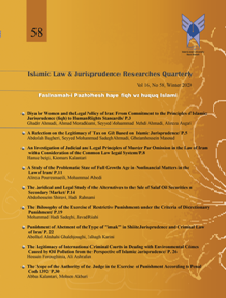A Reflection on the Legitimacy of Tax on Gift Based on Islamic Jurisprudence
Subject Areas : Private lawAbdollah Bagheri 1 , Sayyad Mohammad Sadegh Ahmadi 2 , Gholam Hossin Masoud 3
1 - Student
2 - Teacher
3 - Teacher
Keywords: tax, Unfixed tax, Gift,
Abstract :
Private property is an important issue being discussed in Islamic jurisprudence and law and can be investigated from various perspectives. One such issue is the tax imposed on individuals’ assets and income including the tax on gift which, according to the Direct Taxation Law, individuals are bound to pay. The present descriptive-analytical research probes into the legitimacy of its collection and restrictions imposed on it based on fundamentals of Islamic jurisprudence. The results reveal that, regarding the principles of Islamic jurisprudence on the legitimacy and boundaries of tax on gift, the related positive laws might require revision in terms of the specified amount of tax and the failure to mention a case where the issue of gift is a requirement for the life of the party receiving the gift as an instance of exemption of tax on gift.
قرآن کریم
قانون مالیات مستقیم
_||_
The Holy Quran
The Direct Taxation Law
Abolsalah, T. N. (1403). Alkafi Fi Al-Fiqh. Isfahan: Emam Amiralmo’menin Public Library.
Ahmadi , A., & Vafaeeyegane, R. (2013). Investigation into Islamic Taxes Payment Amounts in Household Expenditures and its Interaction with Economic Growth by Using Social Accounting Matrix. Tax Journal, 16.
Al-Hurr al-Amili, M. Ḥ. (1409). Wasael ush-Shia. Qom: Alulbayt Institute.
Allamah al-Ḥillī, H. (1413). Qawāʾid al-Aḥkām fi Ma’refat al-Halal va al-Haram. Qom: Office of Islamic Publications affiliated with the Society of Seminary Teachers of Qom.
Allamah al-Ḥillī, H. (1420). Tahrir al-Ahkam asharei’ah Ala Mazhab al-Emamiah. Qom: Imam Sadiq Institute.
Amili, M. (1410). Al-lom’a al-Dameshqiah Fi Fiqh al-Emamiah. Beirut: Darol-torath, Al-Darol-Eslamiah.
Azimzadeh, F., & Mohammadi, A. (2012). The Role of common law in the interpretation of non-financial rights of couples. Journal of Islamic Law & Jurisprudence Research, 8(29).
Bahrani, H. (1416). Al-Burhan Fi Tafsir al-Quran. Tehran: Be’sat Foundation.
Fakhruddin Razi, A. (1420). Mafatih al-Gheib. Beirut: Dar al-Ehiya al-Torath al-Arabi.
Hasanzadeh, M., & Khoueini, Q. (2016). The bill of civil law reform in religious exceptions and its inclusion on Imam Khomeini Committee Clients' Pension and Welfare Organization. Journal of Islamic Law & Jurisprudence Research, 12(45).
Hilli, M. A. (1425). Kanz –ol-Erfan Fi Fiqh-ol-Quran. Qom: Mortazavi Publicaitons.
Houman, M. (1977). Dictionary and glossary of Islamic terms. Tehran: Ministry of Planning and Budget.
Ibn-e-Boraj, Q. (1406). Al-Muhazzab (le-Ibn-e-Boraj). Qom: Office of Islamic Publications affiliated with the Society of Seminary Teachers of Qom.
Ibn-e-Edris, M. M. A. (1410). Al Saraer Al Haavi Le-Tahrir Al-Fatavi. Qom: Office of Islamic Publications affiliated with the Society of Seminary Teachers of Qom.
Ja’fari, M. (no date). The Resources of Fiqh.
Khomeini, R. (1423). Velayat-e Faqih. Tehran: The Institute for Compilation and Publication of Imam Khomeini's Works.
Kulayni, M. (1407). Al-Kafi. Tehran: Darol-Kotob al-Islamiah.
Langerudi, M. (1989). Terminology of law. Tehran: Ganj-e-Danesh Publications.
Mafi, H., & Hosseini, K. (2017). Judicial bases of debt exceptions. Journal of Islamic Law & Jurisprudence Research, 7(24).
Majlesi, M. (1403). Bihar al-Anwar. Al-Vafa Institute.
Makarem Shirazi, N. (1995). Tafsir Nemooneh. Tehran: Dar-ol Kotob al-Islamiah.
Mamaghani, A. (1403). Tanghih-ol-Maghal fi Elm-ol-Rejaal. Najaf: lithography.
Moghadari Amiri, A., & Askari, H. (2015). Contract شdjustment in the Imamieh jurisprudence and laws of Iran. Journal of Islamic Law & Jurisprudence Research, 11(41).
Mohaghegh Damad, M. (1406). The principles of Fiqh. Tehran: Center for Promoting Islamic Sciences.
Montazeri, H. A. (1409). Dirasāt Fī Wilāyah Al-Faqīh va Fiqh al-Dowlat al-Islamiah. Qom: Nashr-e-Tafkkor Publications.
Mostafavi, H. (1402). Al-Tahghigh fi Kalamat al-Quran al-Karim. Tehran: Markaz-ol Ketab le-Tarjoma va al-Nashr.
Muhaqqiq al-Hilli, N. J. (1407). Al-Mu'tabar fi sharh mukhtasar. Qom: Sayyedo-Shohada Institute.
Muhaqqiq al-Hilli, N. J. (1408). Sharye’ al-Islam fi Masail al-Halal va al-Haram. Qom: Ismaeilian Institute.
Muhaqqiq al-Hilli, N. J. (1418). Al-Mukhtasar al-Nafi’fi Fiqh al-Emamiah. Qom: al-Matbu’at al-Dinyyah Institute.
Najafi, M.H. (1404). Jawahir al-kalam fi sharh shara’i‘ al-islam. Beirut: Dar Ehya al-Torath al-Arabi.
Nojumi, M. (no date). Al-Rasael al-Fiqhiah. Qom:.
Office of Hawzah and University Cooperation. (1992). Fundamentals of Islamic Economy. Tehran: SAMT.
Sa’di, A. (1408). Al-Ghamous Al-Fiqhi Loghatan va Estelahan. Damascus: Dar-ol-Fikr.
Sadr, M.B. (1417). Iqtisaduna. Qom: Islamic Propagation Office-Khorasan Branch.
Sallar, H. (1404). Al-Marasem Al-Alaviah va Al-Ahkam Al-Nabaviah. Qom: Manshurat al-Haramain.
Sharif Mortaza, A. (1415). Al-Entesar Fi Enferadat Al-Emamiah, Qom: Office of Islamic Publications affiliated with the Society of Seminary Teachers of Qom.
Shaykh al-Mufid, M. (1413). Al-Muqni'ah. Qom: the International Congress on Shaykh Al-Mufid’s Millennium.
Shirazi, M. (1413). Al-Fiqh, Al-Ghavaed Al-Fiqhiah. Beirut: Imam Reza Institute.
Tabarsi, A. (1385). Meshkat al-Anwar fi-Ghorar al-Akhbar. Najaf.
Tabarsi, F. (1993). Majma ‘al-Bayan fi-Tafsir al-Qur'an. Tehran: Naser Khosrow Publications.
Tabatabai, M. (1417). Al-Mizan fi Tafsir al-Qur'an. Qom: Office of Islamic Publications affiliated with the Society of Seminary Teachers of Qom.
The Center for Islamic Information and Documents. (2010). Dictionary of the principles of fiqh. Qom: Office of Islamic Publications affiliated with the Society of Seminary Teachers of Qom.
Tusi, A.J.M. (1407). Al-Khilaf. Qom: Office of Islamic Publications affiliated with the Society of Seminary Teachers of Qom.
Zargoshnasab, A., Alimohammadi, T., & Gheybi, M. (2015). An investigation of jurisprudence principals of unfixed taxes. Journal of Islamic Law & Jurisprudence Research, 11(38).


